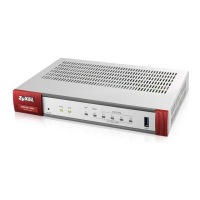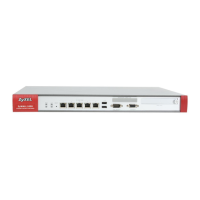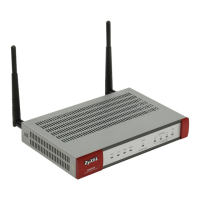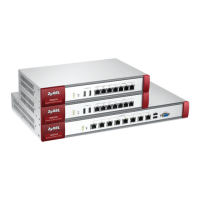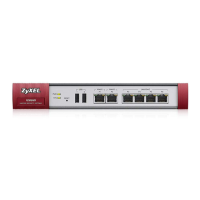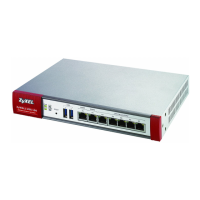Chapter 29 IPSec VPN
ZyWALL/USG Series User’s Guide
546
Encryption This field is applicable when the Active Protocol is ESP. Select which key size and
encryption algorithm to use in the IPSec SA. Choices are:
NULL - no encryption key or algorithm
DES - a 56-bit key with the DES encryption algorithm
3DES - a 168-bit key with the DES encryption algorithm
AES128 - a 128-bit key with the AES encryption algorithm
AES192 - a 192-bit key with the AES encryption algorithm
AES256 - a 256-bit key with the AES encryption algorithm
The ZyWALL/USG and the remote IPSec router must both have at least one proposal
that uses use the same encryption and the same key.
Longer keys are more secure, but require more processing power, resulting in
increased latency and decreased throughput.
Authentication Select which hash algorithm to use to authenticate packet data in the IPSec SA.
Choices are SHA1, SHA256, SHA512 and MD5. SHA is generally considered
stronger than MD5, but it is also slower.
The ZyWALL/USG and the remote IPSec router must both have a proposal that uses
the same authentication algorithm.
Perfect Forward
Secrecy (PFS)
Select whether or not you want to enable Perfect Forward Secrecy (PFS) and, if you
do, which Diffie-Hellman key group to use for encryption. Choices are:
none - disable PFS
DH1 - enable PFS and use a 768-bit random number
DH2 - enable PFS and use a 1024-bit random number
DH5 - enable PFS and use a 1536-bit random number
DH14 - enable PFS and use a 2048 bit random number
PFS changes the root key that is used to generate encryption keys for each IPSec SA.
The longer the key, the more secure the encryption, but also the longer it takes to
encrypt and decrypt information. Both routers must use the same DH key group.
PFS is ignored in initial IKEv2 authentication but is used when reauthenticating.
Related Settings
Zone Select the security zone into which to add this VPN connection policy. Any security
rules or settings configured for the selected zone apply to this VPN connection policy.
Connectivity Check The ZyWALL/USG can regularly check the VPN connection to the gateway you
specified to make sure it is still available.
Enable
Connectivity Check
Select this to turn on the VPN connection check.
Check Method Select how the ZyWALL/USG checks the connection. The peer must be configured to
respond to the method you select.
Select icmp to have the ZyWALL/USG regularly ping the address you specify to make
sure traffic can still go through the connection. You may need to configure the peer to
respond to pings.
Select tcp to have the ZyWALL/USG regularly perform a TCP handshake with the
address you specify to make sure traffic can still go through the connection. You may
need to configure the peer to accept the TCP connection.
Check Port This field displays when you set the Check Method to tcp. Specify the port number
to use for a TCP connectivity check.
Table 209 Configuration > VPN > IPSec VPN > VPN Connection > Add/Edit (continued)
LABEL DESCRIPTION

